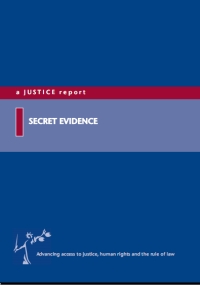
Secret Evidence by Eric Metcalfe (PDF, 241 pages) DOWNLOAD LINK: Secret Evidence: Advancing access to justice, human rights and the rule of law
Justice, an independent legal human rights organisation based in London, Engand and founded in 1957 produced this report on the use of secret evidence in the UK's judicial system. The report details the following concerns: • It is a basic principle of a fair hearing that a person must know the evidence against him. • This core principle of British justice has been undermined as the use of secret evidence in UK courts has grown dramatically in the past 10 years. • Secret evidence can now be used in a wide range of cases including deportations hearings, control orders proceedings, parole board cases, asset-freezing applications, pre-charge detention hearings in terrorism cases, employment tribunals and even planning tribunals. • Defendants in some criminal cases are now being convicted on the basis of evidence that has never been made public. Criminal courts have issued judgments with redactions to conceal some of the evidence relied upon. Evidence from anonymous witnesses has also been used in hundreds of criminal trials and is widespread in ASBO hearings. • Since they were first introduced in 1997, almost 100 special advocates – lawyers prohibited from communicating with those they represent – have been appointed. Indeed, the government itself does not know how many special advocates have been appointed. • This report calls for an end to the use of secret evidence. Secret evidence is unreliable, unfair, undemocratic, unnecessary and damaging to both national security and the integrity of Britain’s courts. • In its place, this report sets out a series of recommendations that include the strengthening current disclosure procedures by the creation of public interest advocates to replace special advocates in PII claims; increasing the transparency of existing court procedures; and ending reliance on ‘reasonable suspicion’ in such proceedings as deportation and control orders. For further information contact the report's author Eric Metcalfe, Director of Human Rights Policy, emetcalfe AT justice.org.uk









